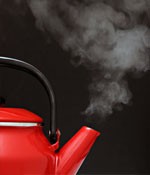Water
All water used for drinking or preparing food must be clean and free of bacteria and other germs (in other words, it must be potable). It is likely that the piped water supply system will have been shut down to minimize contamination and damage. The system will not be turned back on until it has been thoroughly checked. This might take some days or even longer.
- Use water you stored before the storm if it has not been contaminated.
- Use your water sparingly as potable water may be in short supply.
- As far as possible use bottled water for drinking and cooking.
- If your cistern or well has been flooded do not use the water for drinking, food preparation or cleaning utensils as the water may be contaminated. Such water should only be used for flushing the toilet.
- If you are sure your cistern was not flooded you may use the water. Nevertheless, sterilize it before consuming or using for food preparation.
- Rain water should also be sterilized before you drink it or use it for preparing food.
- You can also catch and use rain water for bathing and personal hygiene, but disinfect it first by adding a little disinfectant such as Savlon, Dettol or other disinfectant. Follow the directions that are on the label.
- When the tap water returns, you should sterilize it with bleach or by boiling before you use it for drinking or preparing food. Do this until the water company tells you it is safe for drinking.
How to sterilize water:
- Add 2 to 3 drops of household bleach per gallon of water and let the water stand for at least 30minutes
or - If you own a propane stove you can sterilize water by boiling. Bring water to a boil and let it remain boiling for 30 minutes
or - Add water purification tablets to the water. Follow the manufacturer’s instructions.
Food
- Always wash hands with clean water and soap before handling any foods.
- Always wash hands after touching raw meats, poultry, seafood, or eggs.
- Wash dishes and cooking utensils with soap and clean water promptly after each use to minimize the risk of harbouring insects and rodents.
- Peel the skin off food or wash with soap and water before eating.
- Do not handle food with dirty hands. If you must, try to hold only one section and then discard that portion.
- Buy fresh foods (meats, poultry, fish, eggs, fruits, vegetables) in amounts that can be eaten before they spoil if refrigeration is not available.
- Avoid buying foods prepared with eggs or mayonnaise if they are unable to be kept refrigerated.
- Avoid bruised or very ripe fruits and vegetables as bacteria can more easily pass through the skins.
- When refrigeration is not available, keep foods in the cleanest, driest, coolest place possible.
- Keep raw foods separate from cooked food or ready-to-eat foods.
- Do not consume foods after their expiry date.
- Do not use canned food if the can is dented, leaking, or bulging.
- Poke air holes in plastic bags used to store fruits and vegetables for air to circulate.
- Keep potatoes in a cool, dark, well-aired place, not in plastic bags. Cut away all green spots or sprouts that develop on potatoes.
- Keep foods in clean containers covered with clean lids to protect from insects and rodents.
- Aim to prepare only the amounts that will be eaten at one meal if refrigeration is not available.
- Cooked foods or opened cans of perishable items (such as meats and vegetables) should not be kept sitting out at room temperature for more than 2-4 hours.
- Wash vegetables and fruits thoroughly with clean water before eating or cooking.
Personal Hygiene and sanitation
- Always wash hands with soap and clean water that has been sterilized. If there is no water, use hand sanitizer
- Do not allow children to play in or around standing water.
- Avoid putting hands or other objects that may be unclean into mouth, or touching them to eyes or nose
- Water can be poured into the toilet tank or directly into the toilet bowl to flush away bodily waste. However, if the septic tank is flooded the toilet will not flush. In this case, do not defecate in your toilet. Instead make a makeshift toilet from a small bin lined with plastic garbage shopping bags. After defecating, tie off the bag and place in it a larger bin lined with heavy-duty trash bag to prevent odor. Keep outside in a garbage cage, off the ground or in a fenced-off area that animals cannot get to until garbage collection resumes. If possible keep one bin for human refuse and another for household garbage though both will be picked up together when garbage collection resumes.
Dealing with garbage
If possible, place rotting food and other unpleasant garbage in smaller bags which are discarded in a larger garbage bag within a plastic or metal bin. Placing garbage in plastic bins or raising it above the ground will secure garbage from animals.

